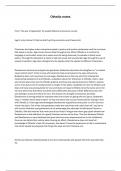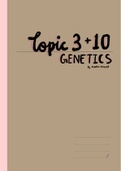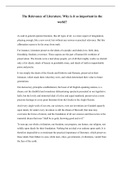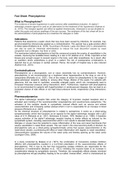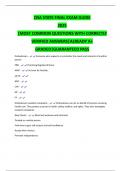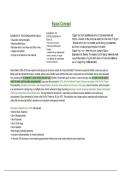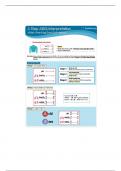From “the war of opposites” by Joseph Rebero (innocence vs evil)
Iago’s only motive I’d that he didn’t get the promotion and Cassio did.
Character the higher order characters speak in poetry and iambic pentameter and the common
folk speak in prose. Iago shows his evil side through prose. When Othello is in control his
language is controlled, when he is aware and not being deceived, he speaks in blank verse
poetry. Through the deception e starts to fall into prose and sounds like Iago through the use of
sexual innuendos. Iago also changes how he speaks when he speaks to different characters.
Desdemona innocence and genuine goodness. Brabantio describes his daughter as “a maiden
never bold of spirit” to fall in love with what she had once feared in his eyes shows how
Brabantio does not truly know his marriage. Desdemona is the one who first initiated the
relationship between her and Othello, outspoken about her attraction to Othello. Calm, clear
and certain about her love for Othello publicly and how she openly denies her father’s wishes
as her new duty is to her husband and no longer to her father. Qualifies her love for Othello and
does not have any prerequisites for love and does not require Othello to be the same as her for
her love (she knew that there would be extra difficulties because of their differences but she
was willing to overcome them for love- this shows her strength of character and will).
Desdemona is strong willed for example when she insists on going with to Cyprus. Brabantio
says a “maiden never bold of spirit” he has not taken into account how bold her asking in love
with Othello is. Even Iago acknowledges Desdemona’s goodness and purity “so will I turn her
virtue into pitch. Out of her own goodness make the mech that will catch them all” and so he
will use her kindness and gentleness to his advantage (her attempts to talk about Cassio to
Othello). She that was fair but never proud but sharp if tongue and never gay quote shows how
Desdemona is the definition of a good Venetian woman at the time. The love between Othello
and Desdemona is very idealised and pure (she has never experienced evil in her childhood,
thus we can defend her nativity about having an affair). Desdemona does not have full
knowledge of Othello’s loss full character; she doesn’t have the experience in life to understand
how other people would grasp the things she says and can’t believe evil.
Emilia can believe wholeheartedly in evil and understands why people think the way that they
do.
, Her love’s reward is murder, and her last breath saves her murderer.
Iago suspicious, course, sarcastic, callous, cruel, deceptive, manipulative. His jealousy of
Cassio is real and the outrage about the job is real, but it seems like an excuse or a scapegoat
to start implementing the downfall of those around him. The rest of his motive are based on
doubt and suspicion, and he never looks for physical evidence to confirm because he doesn’t
really care about having motive for his deeds. Othello asks for the ocular proof to believe his
wife’s ‘doings’. If you have a virtue, it may be hard to believe another person’s vice e.g.,
Desdemona and the cheating vs Emilia and Othello kgs need for proof versus Iago never
wanting physical proof. Imago cannot tolerate the goodness and virtue of others, he is innately
evil by nature and by choice, he can see the good and not tolerate it. Desdemona is so good that
she can not even see the evil in others. Cassio needs to die because he has a beauty that
makes Iago look ugly, he can’t tolerate the good that he sees in Cassio and because of the
jealousy of the promotion. Cold and calculated revenge, not a passionate and immediate
revenge, makes the revenge far more sinister and personal. Opportunistic revenge. He takes
the highest intellectual gifs and places them at the service of the lowest human instincts, Iago’s
war is against goodness and nobility of character. Iago is dedicated to the destruction of
goodness.
Othello’s whole life has been one of war and soldiering and at the end he said that his whole life
had been taken away by Iago. The Turks were the war enemy, but Iago was the true enemy
within the ranks. When Othello says how “the wars are done, the Turks are drowned” it is truly
only the beginning of a war. Iago is not a deceptive person by reputation and also his Venetian
heritage, they would not account evil to him by nature. The “Turk” that remained was the one
who ended up defeating Othello.
There is a time where Iago is nervous because of Othello’s want for ocular proof or else he is
“better born a dog than answer my baked wrath”. Othello is prepared to damn his own soul and
destroy Iago if he is lying about his wife. The raging moor is a very real threat, there is a time
where Iago is not in control of the situation. This is also another reason that Cassio must die
because if Othello uncovers his plan through conversing with Cassio, Othello will end Iago. The
way that Iago tempts Othello shows how he understands jealousy and Othello’s insecurities.
Suggestive and subtle seeing of seeds, a drip technique, chisels away at Othello and does not
make it obvious. Let’s Othello dwell on things and slowly adds fuel to the fire indirectly e.g. “I
like not that” when Cassio and Desdemona are talking.
Othello says that he is not a jealous person. Line 339 on pg. 142? “Of one not easily jealous but
being wrought, perplexed in the extreme” respond very negatively and no longer rationally.
Could it be that Othello is not jealous, but he is possibly so in love and so insecure that he is so
deeply impacted by Desdemona’s all edged act. Feels strong emotions, when he is loving he is
deeply in love, when he is wrought, he one rationality with jealousy. A feeling of betrayal and
heartbreak over the possibility of his beloved cheating on her. A lack of discernment of human
character and human nature when he does not confront Desdemona about the handkerchief

